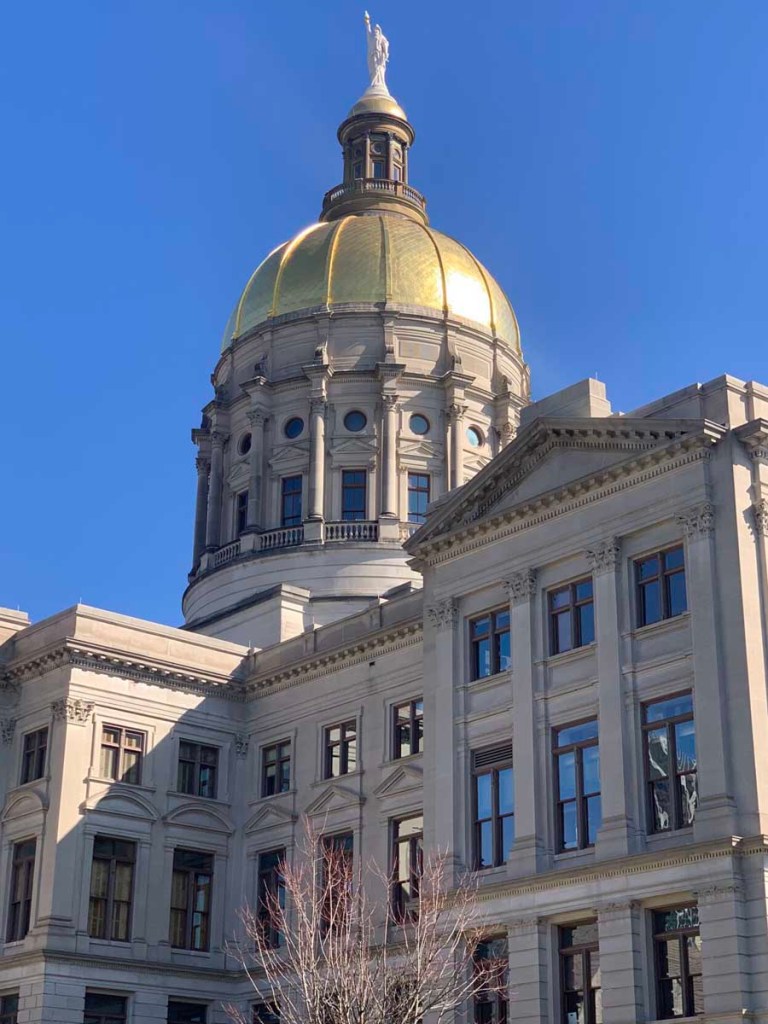Copycat ‘Don’t say gay’ bill makes its way to Georgia
Published 3:09 pm Thursday, February 16, 2023

- Georgia Capitol
ATLANTA — A bill to restrict educators from discussing gender identity or sexual orientation was introduced in the state Senate this week.
Georgia’s Parents and Children Protection Act of 2023 is modeled after Florida’s dubbed “Don’t say gay bill.”
The preface of the Florida law prohibits “classroom discussion about sexual orientation or gender identity,” while the body of the bill states: “Classroom instruction by school personnel or third parties on sexual orientation or gender identity may not occur in kindergarten through grade 3.”
In December, attorneys general in 14 states — Alabama, Alaska, Arkansas, Georgia, Texas, Indiana, Kentucky Louisiana, Mississippi, Nebraska, Oklahoma, South Carolina, Virginia and West Virginia— signed onto an amicus brief in support of Florida in a lawsuit from a group representing Florida parents, teachers and students challenging the law on claims of First and Fourteenth Amendment violations.
According to Movement Advancement Project, Alabama, Louisiana, Mississippi, Oklahoma and Texas have some form of a law preventing discussion about gender identity and proposals are underway in others.
In Alabama, a bill signed into law last year prevents teachers from providing or engaging in instruction regarding sexual identity or gender identity to students in kindergarten to fifth grade at public schools.
Cordele Republican Carden Summers, sponsor of the proposed Parents and Children Protection Act of 2023, said the bill is simply to protect children and keep guardians in the loop.
“We’re trying to limit the exposure that a person would have on a child regarding gender,” Summers said at the Feb. 14 Senate Education & Youth Committee meeting.
If approved, the bill would prevent any school staff person from providing or obtaining information sensitive in nature from a child younger than age 16 (the age of consent in Georgia). Adult staff of public libraries, social services agencies or similar facilities or programs — all grouped “in loco parentis” along with school staff — would also be subject to the bill’s provisions.
Information sensitive in nature, according to the bill, includes sex education and information regarding a child’s sexual orientation or gender identity other than the child’s biological sex.
Buddy Costley, executive director of Georgia Association of Educational Leaders, said in reviewing the bill, principals and superintendents have expressed concern that including sex education in the bill could cause issues in teaching about health.
“If a child discusses something that is in state code that we require as a state for that child to participate in, which in our health programs we think about sexual sex education, and talk about issues of health that are related to that STDs, all the wonderful things we have to talk to our kids about to warn them about,” Costly said at the Feb. 14 Senate Education & Youth Committee meeting. “This is what scares a lot of our members.”
The bill states: if a child indicates a desire to discuss information of a sensitive nature with an adult acting in loco parentis, such adult shall not engage in such discussion without the presence or the express permission of the child’s parents or legal guardian.
The bill said no staff member shall engage in instruction or training of students while dressed in a sexually provocative manner, applying current community standards, which drafter said will add clarification. Students’ gender in school records cannot be changed without the amended birth certificate and without the written consent of all the child’s parents or guardians.
Tom Rawlings, a child welfare attorney who helped draft the bill, said the bill is purposed to make sure parents aren’t left in the dark about a “very significant change that their children are going through.”
“In an age in which the number of teenage girls who are finding themselves with gender dysphoria has doubled recently, we simply want to make sure that in appropriate cases, that parents know what’s going on with our children, and that educators and administrators are not hiding that fact, except when it’s appropriate,” Rawlings said.
Democrat Sen. Sonya Halpern said she would like the bill to embrace a more school-home partnership and a less cynical view of school staff.
“I get it, like I’m a parent, too. I would hate to think that there’s other adults in this world who know things about my child that I don’t because my child is telling them and is not telling me,” Halpern said. “But at the same time, I realize in reality that that’s probably true. … There’s some things children are never going to go to their parents for, but need a trusted adult in the larger village that they can go to.”
Georgia Organizers for Active Transformation, in a news release, said the proposal violates constitutionally protected free speech; infringes on parental and family privacy and decision making; and censors both youth and educators from any conversation or information sharing about LGBTQ+ people and resources within school environments, even if a student is intentionally asking about resources that would be a benefit to their well-being.
Sarah Hunt-Blackwell of American Civil Liberties Union of Georgia agreed that SB 88 violates free speech and that content-based regulations are “presumptively unconstitutional” unless they serve a compelling state interest.
“There is not a compelling interest and limiting non-intimate sex and gender discussions in schools,” Hunt-Blackwell said at the hearing. “If anything, rising suicide rates among LGBTQ+ teens suggests the compelling interest that educators need more resources for these students and should be having more of these conversations, not barring them altogether.”
A public school’s violation of the law would be subject to withholding of state funds.
Summers said he will continue working with other education groups on language and clarifications in the bill, and add protections for children who may reveal sexual abuse to adults acting “in loco parentis.”





